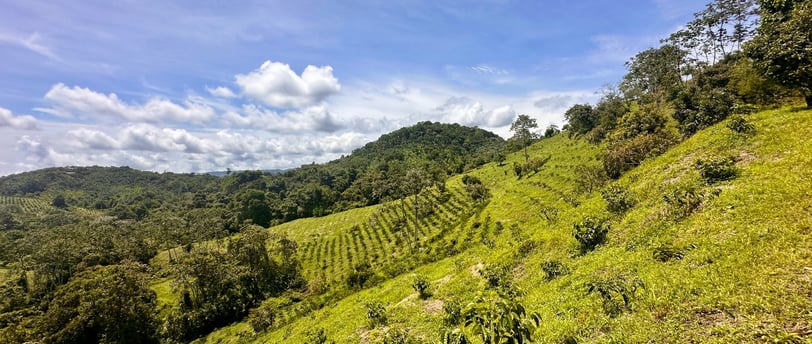First Full Length Episode Available April 20th 2025
From Ethiopian Highlands to North American Cups
Jayce
8/16/20243 min read


The story of coffee's ascent from the verdant Ethiopian highlands to becoming a morning ritual in North America is as compelling as it is rich with history, trade, and cultural transformation. Legend has it that coffee's journey began with Kaldi, an Ethiopian goat herder, who observed his goats dancing with unusual energy after nibbling on berries from a certain bush. This serendipitous discovery would spark the world's enduring love affair with coffee.
Historians largely agree that the coffee plant originated in Abyssinia (present-day Ethiopia), and perhaps Arabia too. It's thought that the first efforts to cultivate coffee began within these regions. An Arabian physician documented the plant's properties in the late 9th century, hinting at its prior existence in the wilds of Abyssinia and maybe Arabia. There's speculation, as noted by the historian Ludolphus, that Abyssinians migrating from Arabia to Ethiopia might have brought the coffee plant with them. Nonetheless, it's the Arabians we credit for both unearthing the joy of coffee and pioneering its cultivation, regardless of its initial discovery in Abyssinia.
The cultivation of coffee in Yemen is believed to have commenced around 575 A.D., after the Persian conquest halted Ethiopian dominion. The cultivation's pace in both Abyssinia and Arabia was initially gradual but gained momentum in the 15th and 16th centuries, particularly in Yemen. Yemeni merchants, protective of their lucrative find, went to lengths to keep their coffee a secret, treating seeds to prevent germination before export.
Yet, the secret couldn't be kept forever. The sheer number of pilgrims traveling annually to Mecca made it impossible to control the spread of coffee seeds. This narrative backdrop sets the stage for the legend of Baba Budan, a Muslim pilgrim credited with smuggling coffee seeds into southern India around 1600. Baba Budan reportedly planted these seeds near his dwelling in the Mysore mountains, where descendants of these plants still thrive under the canopy of ancient trees.
The cultivation of coffee in India saw remarkable expansion in the 19th century, notably with the English establishing plantations around 1840. These plantations now span from Mysore's northern end to Tuticorin, illustrating coffee's transition from an obscure delight to a global phenomenon.
In the late 16th century, European botanists and travelers brought back to the continent a wealth of knowledge about this intriguing new plant and its beverage. By 1614, the Dutch began exploring coffee cultivation and trade possibilities. Their successful transportation of a coffee plant from Mocha to Holland in 1616 marked a new chapter in coffee's cultivation outside its native lands.
Despite earlier introductions by Arabs, the Dutch initiated coffee cultivation in Ceylon (now Sri Lanka) in 1658. However, their attempt to cultivate coffee in European soil, such as in Dijon, France, in 1670, was unsuccessful.
A significant leap in coffee cultivation under Dutch stewardship occurred in 1696, with coffee plants being shipped from Malabar, India, to Java, Indonesia. Despite initial setbacks due to natural disasters, a successful lineage was established through cuttings imported to Java in 1699. This endeavor positioned the Dutch as forefront runners in coffee cultivation.
By 1706, the first samples of Java coffee were celebrated in the Amsterdam botanical gardens. This achievement paved the way for the propagation and distribution of coffee plants across Europe's esteemed botanical gardens and private conservatories.
While the Dutch were extending their cultivation reach, the French aimed to introduce coffee into their colonies. A significant breakthrough came in 1714 when, through diplomatic efforts, a robust coffee plant was presented to King Louis XIV, eventually becoming the progenitor of many coffee varieties across the French colonies and later the Americas.
This enthralling narrative of coffee's origins and its spread across continents is meticulously documented in William H. Ukers' "All About Coffee." This seminal work delves into the historical, botanical, and cultural facets of coffee, illustrating its profound impact on global trade and culture. Ukers' comprehensive exploration provides a foundational understanding of coffee's significant role in shaping societal and economic landscapes worldwide, offering readers a deep appreciation for the rich history of this beloved beverage.
